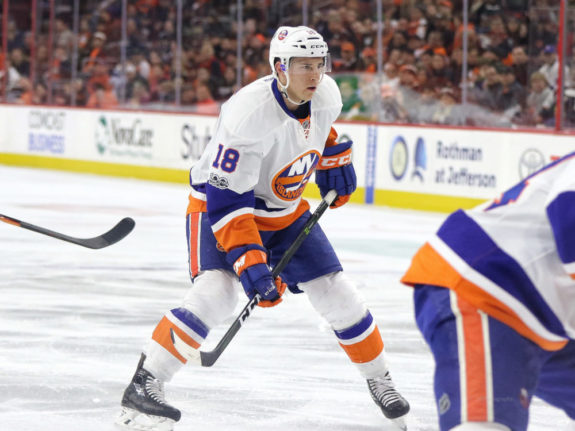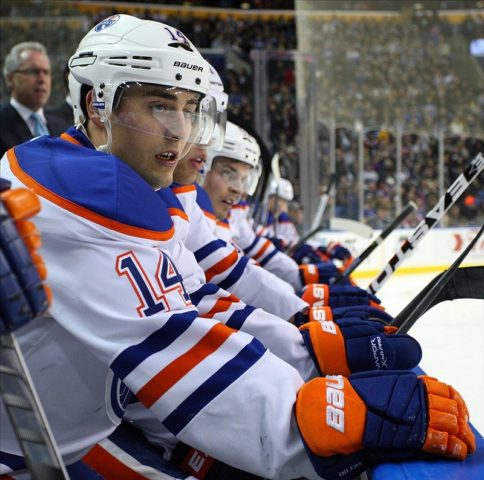When you don’t have a lot of NHL to write about or examine, you find yourself looking back and transactions and moves that already took place. Was this really a good move? Is the team better or worse than it was before? How will the club move forward and where will the new guy play? Fans have asked all of these questions and more when it comes to the deal that sent Jordan Eberle to the New York Islanders for Ryan Strome.
One thing that caught more of my attention than any other aspect, was why the Oilers made the trade; especially during a summer they didn’t have to.
Eberle Trade: On the Face of It
In reality, this trade is absolutely about what most everyone thinks it is — money. Eberle was making $6 million per season and he wasn’t necessarily performing at a $6 million level. Strome was making $2.5 million and he’s often exceeded the level of a $2.5 million player.

If the Oilers feel that a $2.5 million Strome can do more with players like Connor McDavid and Leon Draisaitl around him, they could be getting a bargain. After all, Strome scored 13 goals last season without these two players. He’s also only a couple seasons removed from a 50-point campaign. If he doesn’t, well the Oilers had to eventually clear some money anyway.
In addition, Strome gives the Oilers flexibility to add another piece. On his own, he could be an effective winger or center for the team. He and another asset give Edmonton a more well-balanced attack. Strome himself plays a very different style of game than Eberle did and that bodes well for those who wanted the Oilers to have a different dimension and found Eberle’s style frustrating.
Eberle Trade: Bubbling Underneath
The Oilers won’t come right out and tell you this, but from my conversations with those close to the team, Eberle was a point of frustration for the coaching staff. The same things that drove fans bonkers when he would float around the neutral zone or refuse to backcheck, gave coaches and management fits.

When Peter Chiarelli came in, his mandate wasn’t to make swift changes immediately. But, he did have his eye on players who were given the “franchise” tag prior to his arrival. The plan was to give these players a year or two, see what they had to offer and then make a decision. In Eberle’s case, Chiarelli had seen all he needed to. A one-dimensional player who didn’t kill penalties and wasn’t often consistent in his one-dimension wasn’t a long-term fit on the roster.
Eberle’s “Ya, But” Attitude…
Let’s be clear, I was an Eberle fan. His offensive skill and ability to score in a phone booth were things you’d marvel at and at any moment, you’d be watching an Oilers game and expect him to break a slump or score in bunches. He had that ability. That said, too often, Eberle would use the success of the team as a reason for individual shortcomings.
When asked about how he felt he played, he often deflected the answers to suggest a sort of “ya, but” response. A “ya, but” response is like saying what you did isn’t important because things still worked out. “You’re in a scoring slump.”… “Ya, but the team won.” “What happened on that backcheck?” …”Ya, I got caught, but they didn’t score.”
Of course, I don’t know the actual things that were said between player and coach, but I’ve been led to believe these types of conversations weren’t isolated to one or two instances. That was a problem.
To be fair, it’s not necessarily Eberle’s fault either. Like Hall and Justin Schultz before him, Eberle was surrounded for years by a losing culture. He spent the entire beginnings of his career frustrated at not winning games and that can take a toll on your attitude, motivation and mental approach.
Was that an unfixable problem? Of course not. But, as a general manager, when faced with the task of moving money and forming your team to make the large salaries of players like Connor McDavid and Leon Drasaitl work, the piece you remove is the piece who may be overpaid and needs work on more than just his game.
At the End of the Day
When you look at this trade with a bit more information, some things don’t change. The New York Islanders appear to have gotten the better offensive player. Eberle, even if he’s got some things to work on mentally, is capable of 70 points including 30 goals. Strome has not proven he can do that at the NHL level.

The Oilers also don’t know what they’ll be getting yet personality wise. Perhaps Strome has all the right beliefs, the mental makeup and character to exceed his value on the ice. Maybe he’ll have chemistry with the Oilers top players. Then again, maybe he doesn’t and maybe he won’t. There’s always a chance you’re playing with the devil you don’t know versus the devil you do. That has positives and negatives.
When all is said and done, the Oilers may find out they have a hole in the top-six at the right wing position. They also may have done exactly the right thing in moving on from a player who has played extremely well in the past, but is not completely bought into the new way in Oil Country and ready for a change.